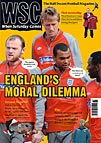 Hard-up clubs are establishing partnerships with other businesses in order to make ends meet. Robert Shaw reports
Hard-up clubs are establishing partnerships with other businesses in order to make ends meet. Robert Shaw reports
The lucrative business of representing and trading Brazilian players is no longer the exclusive preserve of a motley assortment of ex-players and wide boys. These days investment funds and a range of businesses, including supermarkets, are moving in.
A striking example is Sonda, a Brazilian supermarket chain now operating in football through a company called DIS. By establishing partnerships with clubs including Santos and Internacional the Sonda group has quickly established itself in the market. In 2009 its financial muscle helped Santos to hold on to 17-year-old Neymar in the face of interest from European clubs. It has also been involved in the Santos bid to “repatriate” Robinho.
Sonda was instrumental in taking Argentine midfielder D’Alessandro to Internacional. And in recent months it has teamed up with Corinthians in an effort to prise Juan Román Riquelme from his beloved-but-broke Boca Juniors to help Ronaldo, Roberto Carlos and co mount a Libertadores campaign worthy of the club’s centenary. The company also represents Corinthians striker Dentinho and set up the transfer of another corintiano André Santos to Fenerbahce in 2009.
The deal that initially excited the interest of Sonda was the $19 million (£12m) move that took central defender Breno from São Paulo to Bayern Munich in 2008. In June 2007 Sonda bought a 30 per cent share in the player’s transfer rights for just $250,000. That outlay transformed itself into a profit of around $5.5m. This and other experiences have persuaded Sonda to focus on investment on younger players for the bulk of its football business.
The most prominent name in the sector is Traffic, a sports marketing company that has added the management of players’ careers to interests such as broadcasting rights. Traffic has a training centre in São Paulo state and teams at both professional and youth levels. The youth team managed a creditable performance in reaching the quarter-finals of São Paulo’s Junior Cup in January. But these teams are essentially about display, with the selling of their playing assets more important than winning things.
Traffic has also established partnerships with clubs such as Palmeiras – one strained by the team’s disastrous surrender of the 2009 national championship in its closing weeks. The company helped to sign Coritiba striker Keirrison in 2009, having acquired a 80 per cent share in the player. But Keirrison’s subsequent move from Palmeiras to Barcelona was messily handled, triggering the dismissal of coach Vanderlei Luxemburgo when he complained openly. A Benfica loan deal flopped and, now on loan at Fiorentina, Keirrison’s outside chance of making the World Cup has all but evaporated.
Despite the talk of professionalism and partnerships these businesses still prefer to shunt players around, nervous that assets in the 20-25 age range could rapidly depreciate. In 2009 Traffic helped Botafogo to sign a striker Maicosuel, who subsequently became the star performer of the Rio state championship and was snapped up in May 2009 by German club Hoffenheim.
Traffic were instrumental in pushing for the Hoffenheim deal, while Botafogo fans debated the wisdom of building the team’s game plan around one player for little more than four months before seeing him bound for Europe. Botafogo’s share of the loot was little more than £400,000 despite providing him with the shop window to attract European interest.
These groups, companies and supermarkets have managed to take advantage of the indebted nature of Brazilian clubs by offering to contract players or buy part shares in existing squad members. Despite this, the short-term benefits of selling often overcome the clubs’ qualms about selling off the family silver. Larger investments in older players like Riquelme and Robinho are made partly through trading stakes in the cream of the younger talent at the clubs. This explains the attempts to link Robinho’s return to rights over players like Neymar.
Understandably, these businesses prefer to buy players in batches to spread the risk and indeed to set up their own teams to showcase talent, rather than acquiring debt-ridden clubs outright. Until Brazilian clubs diversify revenue through increased replica shirt sales, season tickets and membership schemes, tie-ups with supermarkets and investment groups look set to continue.
From WSC 277 March 2010